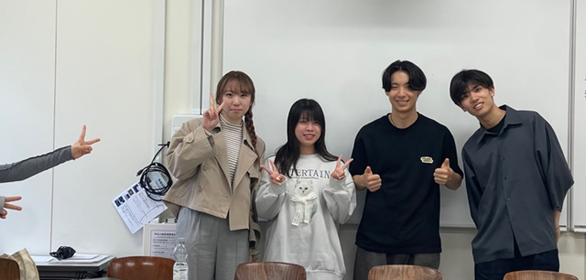by Kota Yamawaki and Hirotaro Yanase
In May 2025, students from Seikei University and FU Berlin met for online interviews about food culture and everyday eating practices in Japan again. This collaboration started during the COVID-19 pandemic and we have arranged for our students to meet online every year since then. Thank you, Yoko Kawamura for this wonderful collaboration! In this post, two students from Seikei University report on their experiences.
Kota wrote:
First of all, thanks a lot for the chance to talk with students from a German university! It was super fun to chat about each other’s food culture. I first got in touch with the students on Instagram, and we had some cool conversations mixing English and Japanese. During the interview, my partners were really friendly and always smiling, so I didn’t feel nervous at all. When they asked me how people in Japan see German food, I thought, “Wow, that’s an interesting question!” I realized I only had sausages in mind when I thought of German food. It’s kind of like when Japanese people say, “Hey, Japanese food isn’t just sushi!” — I bet Germans feel the same way about their food. I thought they’d learn more about Japanese food through the interview, but honestly, I ended up getting more curious about German food instead! Luckily, I’m planning to study abroad in Europe this year, and I want to visit Germany and try the food there. Hopefully, I can meet the two students from the interview again too! Thank you again for giving me such a wonderful opportunity.

Copyright © Yoko Kawamura 2025
Hirotaro wrote:
I had been looking forward to this interview and conversation with students from a German university. Both were very polite and kind, speaking slowly and listening patiently to my imperfect English. Regarding the questions, I had never thought so deeply about what we eat in daily life, so some of them were a little bit difficult to answer. However, this experience could be a great opportunity for deeper reflection. For instance, during the interview, I started wondering about the meaning of „洋食“ (yōshoku). „洋食“ refers to a category of food that can be translated as „Western,“ but it is quite different from authentic Western dishes. Examples include hamburger, steak, omurice and so on. I realized that this type of food is a product of cultural interaction: an attempt to modify foreign foods to suit Japanese tastes, resulting in entirely new and delicious dishes. In this way, the interview sparked my curiosity about the food we eat. Since my major is „International Cultural Studies,“ I felt a strong connection between this discussion and my academic field. I would like to express my sincere gratitude for this valuable opportunity.
